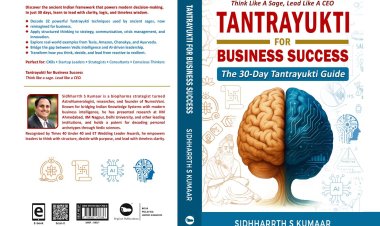Shashank Vashishtha, Executive Director, eXp India, Studies the Indian Real Estate Market Ahead Of a Possible Third Wave
Shashank Vashishtha, Executive Director, eXp India September 28: Reports suggest that the third wave of the Coronavirus is set to hit India in the last quarter of 2021. The real estate market in India has seen a sudden spike after the second wave, with sales in June 2021 accounted for around half of all sales […]


Shashank Vashishtha, Executive Director, eXp India
September 28: Reports suggest that the third wave of the Coronavirus is set to hit India in the last quarter of 2021. The real estate market in India has seen a sudden spike after the second wave, with sales in June 2021 accounted for around half of all sales in the second quarter of 2021. With the demand for second homes, and residential properties going up, Shashank Vashishtha, Executive Director of eXp India, provides some insights on the various segments of Indian Real Estate before the approaching third wave.
Residential Vs. Commercial
According to Mr Vasishtha, there is an increased demand for bigger and more spacious residential properties of the “ready to move in” kind. As learning from the first lockdown, Buyers are keen to upgrade their lifestyle and make their homes a safe space where they can both live and work. Thus, a good absorption rate is seen in the residential real estate segment. On the other hand, commercial real estate has seen a decline with little to no influx of rent and tenants renegotiating or even backing out of their agreements. The Work from Home model has caused a change in the need for office spaces, with employees being hesitant to work in close proximity to one another.
Commercial real estate has seen plans to open up under hybrid models to increase transactions. “It is expected that we can see a slow trickle of employees coming in on a roster system into fully managed workspaces,” comments Mr Vashishtha.
Second Homes
The new normal has brought forth the concept of Working from Home, which millennials have quickly embraced. Developers have taken advantage of this opportunity and launched projects in Goa, Mahabalipuram, Nainital, Kodaikanal, etc. The popularity of these spots increased as employees preferred to work away from the hustle and bustle of the metros. Young parents are also investing in homes in remote areas as they are able to get a bigger and more spacious house for the same price as a standard 2 or 3 BHK close to their first homes. Mr Vashishtha adds, “Living and working from a remote location in tier II or III city means saving money while still spending quality time with your family in a vacation setting.”
Senior Living
NRI’s who are unable to make it into the country due to a scarcity of flights, young professionals who have moved to Tier I cities for their jobs, and other people who have moved out of their native places for various reasons now prefer to have their senior parents living close to them, while also having their own space. Senior citizens themselves have become more open to the concept of assisted living. With opportunities to socialise, and facilities like food and medical help available at a moment’s notice, senior living has found more acceptance as a “hassle-free ageing experience”, especially during the pandemic.
Resale and Pricing:
Macroeconomic factors have led to the pricing of real estate properties going down after the first wave and staying the same after the second. Moreover, clients cannot come to a decision as many of them have lost their near and dear ones and are facing financial and physical loss. Developers have also reached a threshold and are now trying to maintain the prices by offering freebies like car parks, removal of PLC’s, apartment furnishings, etc. Says Mr Vashishtha, “Some developers in metros now give vouchers. For example, a 50 lakh voucher can be used for interior decoration once the sale is made. Similarly, the industry is seeing a surge of benefits without compromising the price.”
“When it comes to resale, there is a good demand for independent bungalows or plots in all metro cities,” he continues. The sector is frequently seeing high ticket transactions (estimated at 4000 crores) such as D-Marts and farmhouses.
The Real Estate Sector in India is undergoing a vital transformation that will make it one of the biggest contributors to the GDP in a short time. All of these ups and downs will only serve to make it reach that stature. “We have exciting things to look forward to for the sector as a whole, and the pandemic and the likely third wave is but a small challenge that we will overcome,” says Mr Vashishtha.
About eXp:
eXp Realty is a cloud-based brokerage agency launched in India in November 2020. A subsidiary of eXp World Holdings, eXp India is on the top of the list of the fastest-growing real estate companies in the country. Within just a year of launch, eXp is expected to hit over 1000 agents on their platform. The company has begun transactions in major metro areas, including Delhi-NCR, Mumbai, Bangalore, Chennai Kolkata, Hyderabad, Jaipur, Agra, Indore, Surat, Ahmedabad and many more.
eXp is set apart from its competitors primarily through its completely virtual work model. They are revolutionising the real estate landscape in India through their immersive cloud-based platform. eXp World or Virbela, a 3D platform, is a “virtual office” which comes replete with choices of daily clothing, accessories, meeting rooms, cafe areas, conference and presentation tools and much more for their agents.
Virbela also hosts a suite of marketing resources that enhances virtual visual prospecting, training, sales and communication for real estate agents. Moreover, eXp’s global network of agents also uses this platform to exchange business expertise and even for global partnerships on transactions.

































